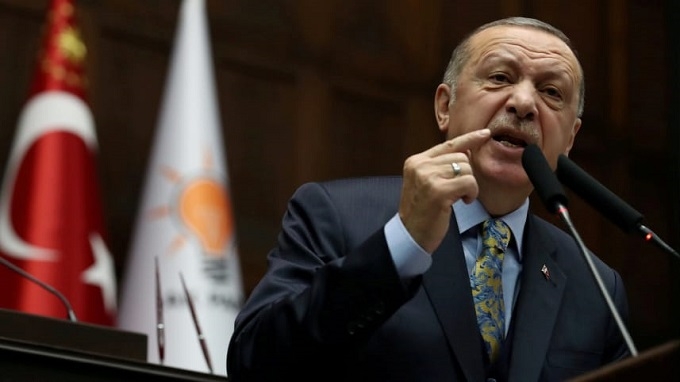


 Turkey falls into its first recession in a decade, dealing a blow to
President Recep Tayyip Erdogan as the country heads toward municipal elections
this month. (Photo: Reuters)
Turkey falls into its first recession in a decade, dealing a blow to
President Recep Tayyip Erdogan as the country heads toward municipal elections
this month. (Photo: Reuters)
The Turkish Statistical Institute (TUIK) recently stated that the country’s gross domestic product (GDP) in the last quarter of 2018 decreased by 2.4% compared to the previous quarter. For the whole year of 2018, Turkey’s GDP rose by 2.6%, still much lower than the 7.4% increase of 2017. With two consecutive quarters of economic downturn, Turkey has officially slipped into an economic recession after a difficult period. Inflation rate still remains at a high level after hitting 25.24% in October 2018, a record high in the past 15 years. President Erdogan’s administration has attempted to curb increase in consumer prices, especially for the products consumed daily by the people. However, according to analysts, economic data shows that inflation still weighs heavily on household consumption, while domestic demand stays weak.
The economy on a decline momentum, together with the currency crisis in 2018, are the sensitive issues for President Erdogan and his ruling Justice and Development Party (AKP) prior to the municipal elections, slated for March 31. The issues of growth and inflation are considered the top concerns of voters. Turkey last fell into a recession in 2009 after the global economic crisis seriously affected domestic and foreign demand.
Notably, the current economic difficulties stem somewhat from US sanctions against Turkey. In August 2018, the US imposed several sanctions against Turkey concerning Turkey’s detention of US pastor Andrew Brunson. Although the two countries then took moves to reduce tensions and lift retaliatory sanctions against each other, relations between the two allies were still not so smooth. Recently, US officials said that the US intends to end preferential tariffs for Turkey under the direction of President Donald Trump. Turkey argued that the US’s decision to end preferential trade treatment for Ankara goes counter to the goal of increasing annual two-way trade revenues to US$75 billion, while harming the efforts of NATO allies aiming to increase their trade exchange.
Meanwhile, despite US sanctions against Iran, Turkey is still negotiating with the Islamic nation on the possibility of establishing joint industrial zones. Antarctica is seeking for low-cost energy sources from Iran for its industrial production projects. As an important importer of natural gas from Iran, with 11 billion cubic metres being transported through the Tabriz-Ankara pipeline annually, Turkey affirmed that it will not cut off. trade with Tehran, regardless of the US pressuring other countries to stop buying Iran’s oil. Turkish President Erdogan recently announced that Ankara is seeking to raise its annual trade turnover with Iran from US$10 billion to US$30 billion. Narrowing disagreements and promoting cooperation with Russia is also a calculation that Turkey is pursuing. The country has strengthened strategic cooperation in the field of energy with Russia by promoting the finalisation of a gas pipeline under the Black Sea and the construction of the first complex of the Akkuyu nuclear power plant. With economic and geo-political interests, Turkey continues to promote relations with non-NATO countries, despite displeasure from its US ally.
In addition to the issue of foreign affairs, such as the smooth handling of ties with NATO allies and other countries, boosting economic development is one of the key tasks of the Turkish government. Driving the country through "storms” is a big challenge for President Erdogan as Turkey is facing huge pressure from both at home and abroad.